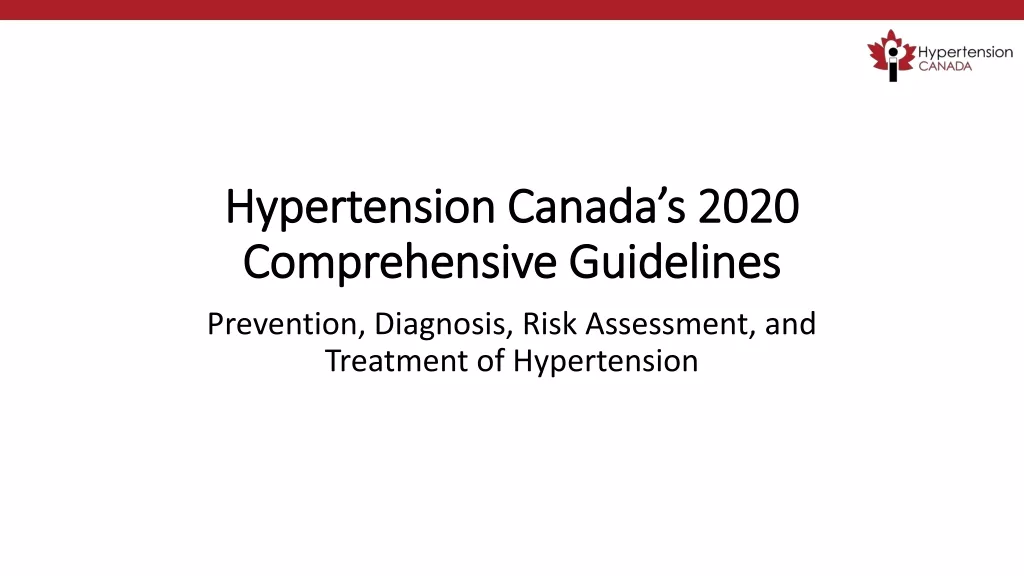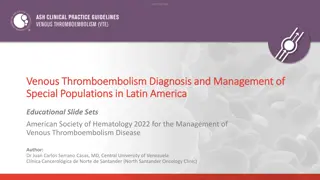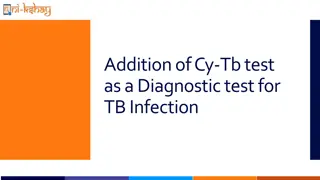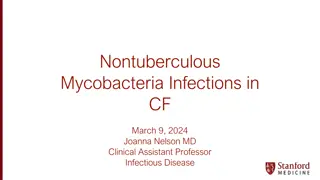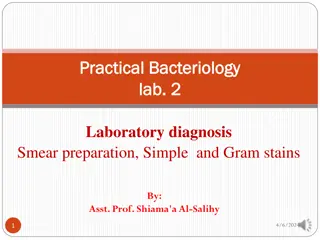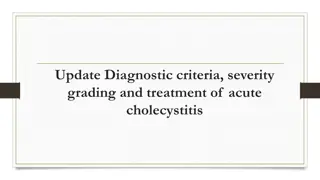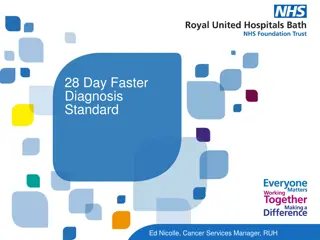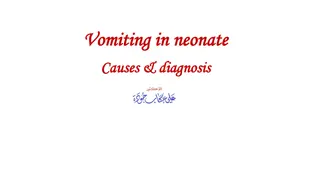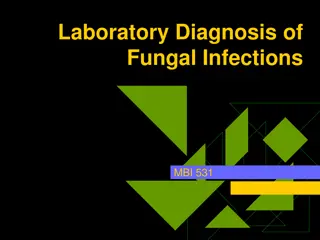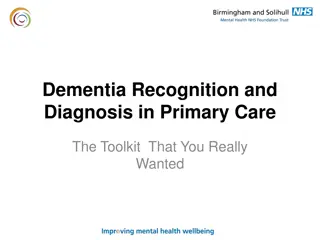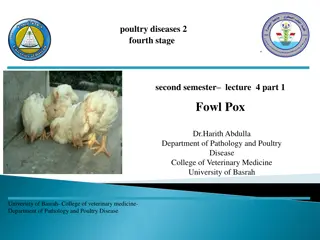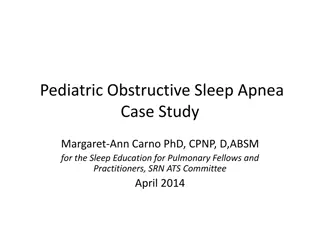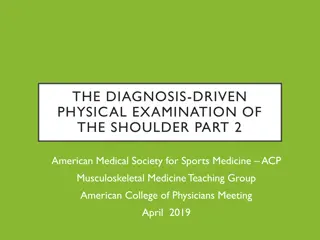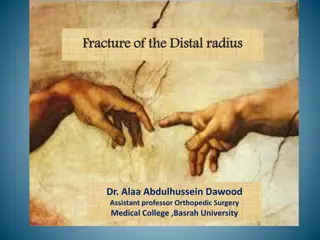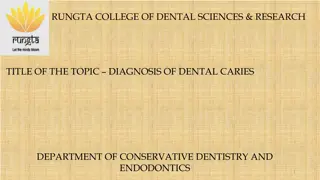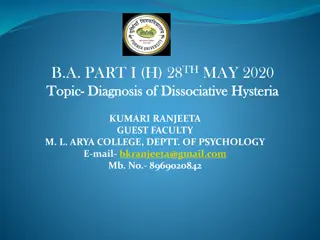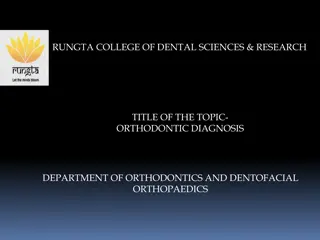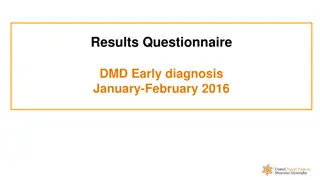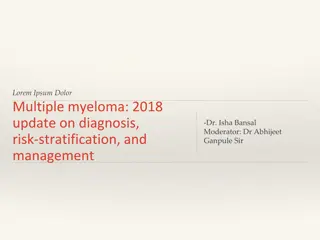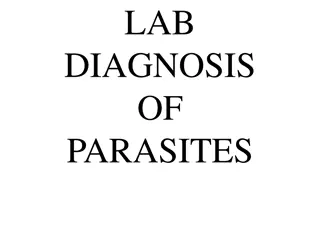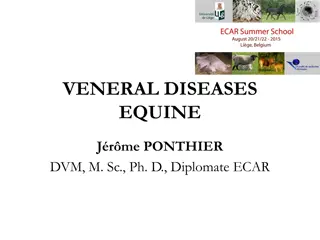Management of a Mute Patient
The differential diagnosis and management of mutism in patients. It covers the types of mutism, including elective mutism, selective mutism, and total mutism, and provides insights into the underlying psychological issues. The presentation also highlights the importance of proper diagnosis for effec
3 views • 34 slides
[PDF] DOWNLOAD READ Diagnosis Solving the Most Baffling Medical Mysterie
\"[PDF] Download Diagnosis: Solving the Most Baffling Medical Mysteries Ebook | READ ONLINE\nDownload File => https:\/\/greatebook.club\/?book=0593136632\nDownload Diagnosis: Solving the Most Baffling Medical Mysteries read ebook Online PDF EPUB KINDLE\nDiagnosis: Solving the Most Baffling Medical M
3 views • 1 slides
Understanding Alinity i STAT High Sensitivity Troponin-I for Cardiovascular Diagnosis
Alinity i STAT High Sensitivity Troponin-I is a proprietary assay used in diagnosing myocardial infarction (MI) by quantitatively measuring cardiac troponin I in human plasma. This chemiluminescent microparticle immunoassay (CMIA) aids in the detection of MI, a significant aspect in managing heart d
2 views • 30 slides
Automated Mobile App QoE Diagnosis with Cross-layer Analysis
This work presents the QoE Doctor, a solution for accurate and repeatable QoE measurements and analysis in mobile apps. By introducing UI automation, it enables the replay of user behavior to measure UI layer QoE metrics without modifying app source code. The QoE Doctor also supports multi-layer dia
3 views • 28 slides
Comprehensive Guidelines for Hypertension Management in Canada 2020
The Hypertension Canada's 2020 Comprehensive Guidelines provide insights on prevention, diagnosis, risk assessment, and treatment of hypertension in adults and children. The guidelines emphasize standardized blood pressure measurement, risk factors, and the use of out-of-office monitoring for accura
2 views • 62 slides
Understanding Spondylodiscitis: Diagnosis, Treatment, and Prognosis
Spondylodiscitis is an infectious inflammation affecting the spine's discs and adjacent vertebrae, posing challenges due to potential complications like abscess formation. Early diagnosis and prompt treatment are crucial for a favorable outcome, focusing on infection eradication, pain management, de
0 views • 22 slides
Venous Thromboembolism Diagnosis and Management in Latin America: ASH 2022 Educational Slide Sets
The American Society of Hematology (ASH) 2022 guidelines for the diagnosis and management of venous thromboembolism in special populations in Latin America are presented in educational slide sets authored by Dr. Juan Carlos Serrano Casas and other experts. The Latin American ADOLOPMENT project, a co
0 views • 52 slides
Implementation of Cy-Tb Test for TB Diagnosis and Treatment Prioritization
In the 2023-24 program, a new test type called Cy-Tb has been introduced alongside TST and IGRA for diagnosing TB infection. This addition aims to facilitate the identification of individuals requiring preventive treatment, particularly in high-risk groups. By selecting "Diagnosis of TBI" as the rea
1 views • 11 slides
Understanding Nontuberculous Mycobacteria Infections in Cystic Fibrosis
Nontuberculous mycobacteria (NTM) infections present a significant challenge in individuals with cystic fibrosis (CF). These infections are caused by over 200 species of atypical mycobacteria found in various environments. The CF-ID Clinic plays a crucial role in managing patients with multi-drug re
2 views • 25 slides
Practical Bacteriology Laboratory Diagnosis and Sample Collection
This practical guide focuses on laboratory diagnosis steps in bacteriology, covering specimen collection, microscopic examination, culture tests, biochemical tests, serological tests, and molecular tests. Learn about various sample collection methods for urine, stool, swabs, sputum, pus, CSF, and mo
3 views • 23 slides
Radiographic Imaging Methods of the Respiratory System
Radiographic imaging plays a crucial role in the evaluation and diagnosis of thoraco-mediastino-pleuro-pulmonary conditions. Techniques like radioscopy, digital radiography, computer tomography, magnetic resonance imaging, conventional pulmonary angiography, and hybrid imaging methods offer detailed
10 views • 21 slides
Autism - What is it and how can you support an autistic person?
Autism Spectrum Disorder (ASD) is assessed using DSM-5 criteria, focusing on impairments in emotional reciprocity, relationships, and communication. Individuals may also display difficulties in movements, routines, interests, and sensory needs. Beyond ASD, considerations include ADHD, anxiety disord
3 views • 24 slides
Gallbladder Pain Reasons, Diagnosis, and Treatment
Gallbladder pain can be a distressing experience for individuals. Understanding the causes, seeking accurate diagnosis, and receiving proper treatment are essential for managing this condition effectively. In this blog post, we will explore the reasons behind gallbladder pain, the diagnostic process
1 views • 7 slides
Overview of Acute Cholecystitis: Diagnosis, Severity Grading, and Treatment
Acute calculous cholecystitis is a common digestive disease with varying treatment perspectives. The Tokyo Guidelines 2018 provide criteria and severity grading for the diagnosis of acute cholecystitis. Diagnosis involves local and systemic signs of inflammation along with specific imaging findings.
0 views • 18 slides
28 Day Faster Diagnosis Standard in Cancer Services
The 28 Day Faster Diagnosis Standard focuses on timely referral to definitive diagnosis for suspected cancer patients, enabling prompt treatment initiation or providing peace of mind. Key principles include starting the clock upon receipt of referral and ending it upon diagnosis communication or tre
0 views • 7 slides
Neonatal Vomiting: Causes, Diagnosis, and Differential Diagnosis
Neonatal vomiting can be a concern when presenting with bile-stained or blood-stained vomit, projectile vomiting, or associated with weight loss and failure to grow. Various non-surgical and surgical conditions like Pyloric Stenosis can lead to vomiting in neonates. Common causes include Mid-gut vol
0 views • 16 slides
Laboratory Diagnosis of Fungal Infections: Specimen Collection and Transport
In the laboratory diagnosis of fungal infections, proper collection and transportation of specimens are crucial for accurate diagnosis and treatment. Different sites and types of specimens require specific collection techniques to avoid contamination and ensure viability. From superficial to systemi
0 views • 29 slides
Understanding Tetanus: Causes, Symptoms, and Diagnosis
Tetanus, also known as Locked Jaw or Saw Horse disease, is a highly fatal condition in domestic animals caused by the neurotoxin produced by Clostridium tetani. The disease is characterized by hyperaesthesia, tetany, and convulsions. Transmission occurs through contaminated soil, typically from hors
0 views • 10 slides
Clinical Diagnosis and Assessment of Pre-Labour Rupture of the Membranes
Pre-Labour Rupture of the Membranes (RROM) is characterized by the leakage of amniotic fluid before the onset of labor, particularly when the gestational age is less than 37 weeks. Clinical diagnosis involves a thorough history evaluation and examination, including sterile speculum examination to co
0 views • 18 slides
Dementia Recognition and Diagnosis in Primary Care Toolkit
This toolkit provides comprehensive information on dementia recognition and diagnosis in primary care settings. It covers the assessment process, clinical presentations, stages of diagnosis, and key questions for identifying cognitive decline. Images and descriptions enhance understanding of the too
0 views • 33 slides
Comprehensive Overview of Parotid Tumor Diagnosis and Management
This comprehensive guide covers the diagnosis and management of parotid tumors, including anatomy, differential diagnosis, and management strategies. It discusses the approach to evaluating patients with neck lumps, differential diagnoses to consider, and the management techniques for both benign an
0 views • 20 slides
Understanding Fowl Pox in Avian Species: Causes, Symptoms, and Diagnosis
Fowl Pox, caused by Avipoxvirus, is a contagious disease in birds characterized by wart-like nodules and diphtheritic membranes in the throat and mouth. It has multiple forms, including dry pox, wet pox, and coryza-like form, with varying clinical signs. The disease spreads through mosquitoes, bitin
1 views • 10 slides
Radiology Case Presentation: Differential Diagnosis of Large Posterior Fossa Mass in 25-Year-Old Male
25-year-old male with persistent headaches and neck pain presents with worsening symptoms. Differential diagnosis includes primary brain tumor, pyogenic abscess, pilocytic astrocytoma, medulloblastoma, and other possibilities. Neurocysticercosis, a parasitic disease caused by T. solium, endemic in c
0 views • 18 slides
Reflex Urine Culturing in UTI Diagnosis: Dos and Don'ts
Reflex urine culturing is a crucial diagnostic strategy for UTIs in hospitalized patients, emphasizing the importance of suspicion over urinalysis. Misuse can lead to increased positive cultures. Understanding the relevance to SPARC and focusing on diagnostic stewardship can help prevent unnecessary
0 views • 21 slides
Challenges Faced by Pregnant Women with HIV Diagnosis in Malawi
Maria, a pregnant woman in Malawi, faces the challenge of an unexpected pregnancy and a positive HIV diagnosis. The scenario explores her concerns, midwifery diagnosis, preparation for HIV testing, disclosure of results, and maintaining confidentiality in antenatal care. It also delves into factors
0 views • 10 slides
Pediatric Obstructive Sleep Apnea Case Study: Diagnosis and Management
This case study revolves around a 6-year-old African American male initially diagnosed with asthma but still experiencing persistent snoring, headaches, and restlessness. Through a detailed examination, the healthcare provider explores the possibility of pediatric obstructive sleep apnea (OSA) and d
0 views • 22 slides
HIV Diagnosis Trends in Ireland (November 2018)
The HIV diagnosis rate in Ireland has shown stability with some fluctuations between 2015 and 2017. There were increases and decreases in diagnosis rates among males and females, with notable trends in different age groups. Diagnoses among men who have sex with men slightly decreased, while there wa
0 views • 21 slides
Diagnosis-Driven Physical Examination of the Shoulder Part 2: Key Considerations and Case Study
This resource delves into the diagnosis-driven physical examination of shoulder conditions, covering common conditions, key historical factors, and provocative maneuvers for differential diagnosis. It presents an organizational scheme for musculoskeletal assessments and details various shoulder cond
0 views • 34 slides
Distal Radius Fracture: Diagnosis, Management, and Complications
Distal radius fractures, particularly Colles fractures, are common injuries, often affecting elderly women due to osteoporosis. These fractures typically result from a fall onto an outstretched hand, causing dorsal and sometimes radial displacement of the distal radius fragment. Clinical features in
0 views • 32 slides
Understanding the Diagnosis of Dental Caries in Conservative Dentistry and Endodontics
This presentation covers the classification of dental caries based on anatomical site, focusing on pit and fissure caries. It discusses the development, appearance, and diagnosis of pit and fissure caries, as well as the morphology of fissures. Learners will gain knowledge on the specific learning o
0 views • 37 slides
Understanding Diagnosis and Treatment of Dissociative Hysteria in Psychology
The diagnosis of dissociative hysteria involves careful consideration to differentiate from organic illness. Factors such as emotional stress, time relationship with stress onset, symbolic meaning of symptoms, and course of symptoms in response to treatment play key roles in diagnosis. Psychotherapy
0 views • 6 slides
Orthodontic Diagnosis: Essential Tools and Techniques
This detailed guide covers essential diagnostic aids for orthodontic diagnosis, including case history, general examination, intraoral examination, supplemental diagnostic aids, orthodontic study models, diagnostic setups, facial photographs, electromyography, radiographs, recent advances, and more.
0 views • 39 slides
Insights from DMD Early Diagnosis Questionnaire - January & February 2016
Detailed findings from a questionnaire on Duchenne Muscular Dystrophy (DMD) early diagnosis in various countries: average age of DMD diagnosis, medical programs for young children, first person to detect issues, duration between concerns and diagnosis, diagnosis makers, parental information receptio
0 views • 11 slides
Understanding Appendicitis: Causes, Symptoms, and Diagnosis
Appendicitis is a common cause of acute abdominal pain requiring surgical intervention. It predominantly affects individuals between 10 to 20 years, with abdominal pain being a key symptom. Diagnosis often involves imaging tests such as CT scans or ultrasound, along with physical examinations like R
0 views • 17 slides
Understanding Genu Valgum: Causes, Symptoms, Diagnosis, and Treatment
Genu valgum, also known as knock knees, is characterized by inward angulation of the legs at the knee joint. This condition can arise from various factors such as rickets, growth imbalances, muscle weakness, injuries, and more. Symptoms include visual separation of the ankles, altered gait, and pote
0 views • 6 slides
Understanding ADHD Subtypes and Diagnosis Criteria in DSM-IV-TR
ADHD, as defined in the DSM-IV-TR, encompasses three subtypes: Predominantly Inattentive Type, Predominantly Hyperactive-Impulsive Type, and Combined Type. To meet diagnostic criteria for each subtype, specific symptoms must be present for a certain duration and at a degree that is maladaptive. Indi
0 views • 23 slides
Update on Multiple Myeloma: Diagnosis, Risk Stratification, and Management in 2018
Multiple myeloma is a significant hematologic malignancy with varying stages of progression. From the asymptomatic MGUS to the more advanced SMM, early diagnosis and risk stratification are crucial. The presence of myeloma defining events, specific biomarkers, and established criteria guide the diag
0 views • 40 slides
Laboratory Diagnosis of Parasites: Methods and Clinical Specimens
Laboratory diagnosis of parasitic infections involves techniques such as demonstration of parasites, immunodiagnosis, and molecular biological methods. Clinical specimens for diagnosis include blood, urine, genital specimens, sputum, and tissue biopsy/aspiration. Chyluria, a condition with milky whi
0 views • 24 slides
Equine Venereal Diseases: Diagnosis and Treatment Overview by Jrme PONTHIER DVM
Learn about the diagnosis and treatment of equine venereal diseases such as Taylorella equigenitalis in horses. Understand the pathogenesis, transmission, and legal obligations for these diseases in the UE (European Union). Discover the general approaches for diagnosis and treatment in stallions and
0 views • 17 slides
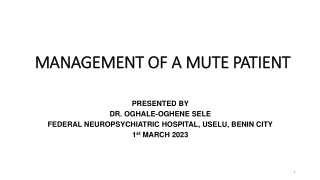
![[PDF] DOWNLOAD READ Diagnosis Solving the Most Baffling Medical Mysterie](/thumb/9855/pdf-download-read-diagnosis-solving-the-most-baffling-medical-mysterie.jpg)


